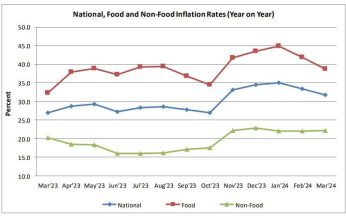Banks yet to react to policy rate cut
Bankers Association of Malawi (BAM) says commercial banks will react to the policy rate cut differently according to their internal business policies.
BAM chief executive officer Lyness Nkungula was reacting to a question on when the banks will pass on the benefits of the 150 basis points cut to policy rate from 13.5 percent to 12 percent announced by the Reserve Bank of Malawi (RBM) on Friday.

She said the policy rate cut will help to improve commercial banks’ capacity to lend.
Said Nkungula: “As you know, the balance sheets cannot remain the same in this period of coronavirus that has redefined many business models.
“By reducing interest rates, the central bank will help to spur business spending on capital goods, which also helps the economy’s long-term performance and can help spur household expenditures.”
On their part, economic commentators say the policy rate cut will help to reduce the cost of borrowing from commercial banks and help to stimulate economic activities.
But consumer rights activist John Kapito said in an interview yesterday that while banks take time to respond to policy rate cuts, the interest rate spread has remained wide despite the monetary authorities interventions.
He said money from the banks is expensive because of the wide spread, which hovers at around 15 percent.
Kapito, who is Consumers Association of Malawi executive director, said: “By reducing the policy rate, the benefits are supposed to accrue to banks, businesses and consumers. But we have noticed slow movement from commercial banks when the policy rate and the interest rate spread is still wide.
“People are failing to pay loans and borrow funds, because of the large spread. The banks are not being honest with consumers. We need intervention from the central bank on this.”
Since June 2019, RBM had maintained the policy rate at 13.5 percent from 14.5 percent in April 2019.
During the period, reference rate has averaged 13.3 percent while savings rate has average 4.2 percent.
However, commercial bank loans have been attracting interest rate in excess of 26 percent.
On annual basis, RBM figures show that private sector credit continued to expand in 2020, albeit more slowly since June 2020.
The figures further show that the annual growth rate of private sector credit edged up to 9.9 percent in August 2020 from 5.2 percent in the previous month, but remained lower than 18.8 percent in the corresponding period of 2019.
Month-on-month, private sector credit increased by 2.6 percent (K14.3 billion) to K573.5 billion in August 2020 compared to a contraction of 1.2 percent in July 2020.
Malawi Confederation of Chambers of Commerce and Industry director of buisness environment and policy advocacy Madalitso Kazembe hopes banks will respond to the reduction in policy rate as that would lead to a reduction in cost of borrowing.





